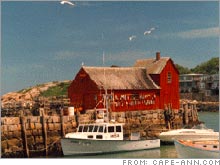|
The dry life
Places all over the United States prohibit the sale of alcohol. People still want to live in them.
NEW YORK (CNNMoney.com) - When people say they live in a "dry town," they don't mean Tucson. There are numerous cities, towns, and counties across the United States where the word "prohibition" doesn't refer to an historic era of bootleggers and bathtub gin; many places still ban the sale of alcoholic beverages � and want to keep it that way. Often, residents believe bans enhance their town's family atmospheres, shield them from crime and social problems, and preserve property values.
Mississippi has 26 dry counties and 44 wet. Nearly half of Alabama counties are dry. Of Texas's 254 counties, 46 are dry and 169 "moist," meaning alcohol is served under some circumstances, such as to members of easy-to-join clubs. There are even 12 totally dry towns in sinful New York State. How dry the Ocean City
One dry place, Ocean City, New Jersey, has stayed that way since its 1879 founding by Methodist ministers. The ban was part of an extensive list of taboos, including "blue laws," most of which were in effect until 1987. "When those laws were repealed some people thought there would be a movement to repeal the alcohol laws as well," say Henry "Bud" Knight, mayor of Ocean City. "But that never happened. The town has prospered without it." Gary Jessel, of Fox Real Estate in Ocean City, says Ocean City benefits from the taboo. "It differentiates us from lots of nearby areas," he says. "We're just a short hop from Atlantic City and all the night life you could want. It's the best of both worlds." It doesn't seem to have hurt property values. Jessel estimates the average single-family house sells for $750,000. "The majority of residents are happy to have the nice, quiet atmosphere," he says. Mark Grimes, a broker with Ocean City Realty, says, "A client just told me the other day that they come to Ocean City because there is no liquor on the island." Knight points out The Travel Channel named Ocean City the top family beach resort in the country. "It's become a mecca for second homes," he says. No Scotch here
Argyle, population 3,688, is no high-powered resort; it's a quiet farming and small-manufacturing community and the largest dry town in New York State. Town supervisor, Gordon Aubrey, reports that most residents like it like that. "It's a pleasant place to live," he says. "The few votes we've had on the issue, it gets defeated by a big margin." A three-bed, two-bath, 1,400 square foot house in Arglye starts around $250,000, comparable to nearby wet towns, according to Brian Norman, a broker with Balfour Realty. He claims, however, that "dry" is misleading. "There are more bars per capita in Argyle than any other place I know of. Only they're in people's homes," he says. When towns do choose to go from dry to wet, disaster does not necessarily follow, despite dire predictions of drinking opponents. The picturesque town of Rockport, Massachusetts just went wet after more than 150 years of prohibition. The repeal movement in Rockport picked up steam this past year as the real estate and tourism booms altered the town's character and demographics. "The price of real estate is driving out the old timers," says town administrator, Michael Racicot. "Only the wealthy can afford to live here now." The least expensive three-bed, two-bath, single-family house listed at Realtor.com sells for $420,000. Peter Beacham, an antiques store owner who helped lead the repeal proponents, says, "The opposition used scare tactics, that the crime rate would go up, that kids could no longer work in restaurants, but the reality is that there's less drinking now." The new rules address opponent's concerns. Only restaurants may serve drinks and only accompaning a meal. The bar ban stands and no signs may advertise alcohol. The main reason cited for repealing the law was to enable restaurants to remain open after the tourist season ends in October. "It improves the quality of life for the year-round residents when you don't have to leave town to eat out," Beacham says. It seems to have worked; three restaurants kept their doors open this winter. One of them, The Greenery, is run by Amy Hale, whose family has lived in Rockport for generations. "Repeal definitely had a positive impact," she says. "Even though alcohol only accounts for 5 to 10 percent of my sales, it has increased business much more. A party of five might have just one person who wants to have a drink. They can now come here instead of going out of town." Hale says, "Many of the old families who opposed the change are coming around. I've had a few who were against it come up to me and say we did a good thing for the town."
|
|

